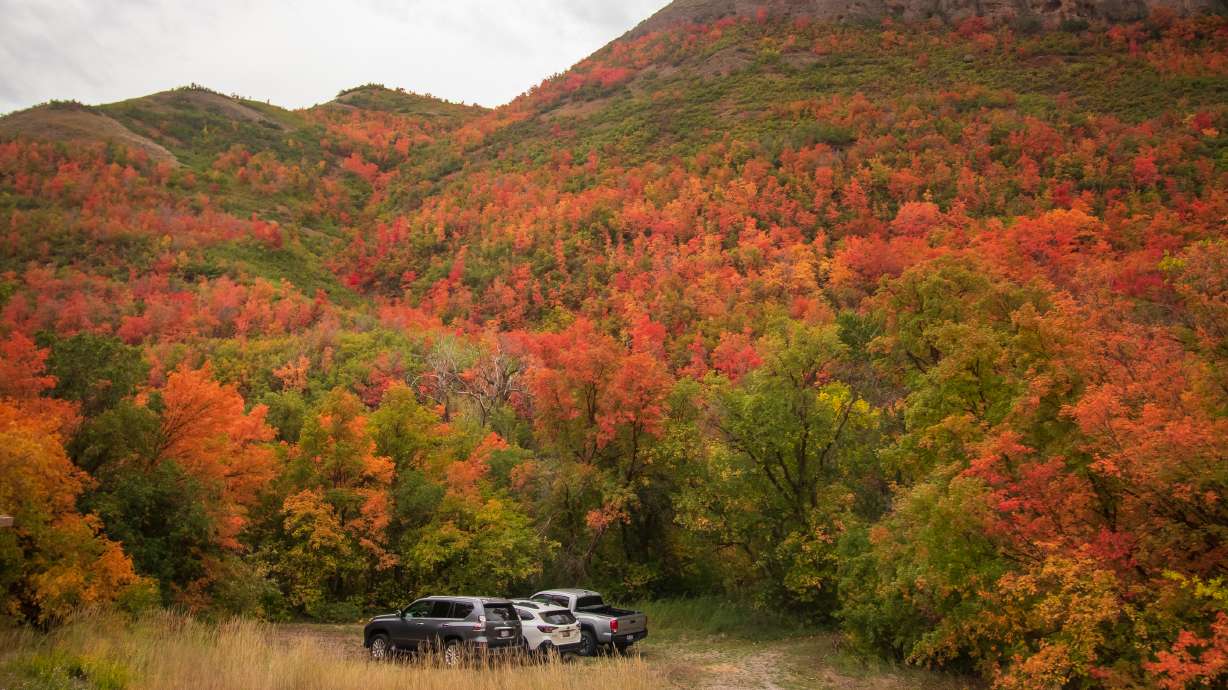Estimated read time: 5-6 minutes
This archived news story is available only for your personal, non-commercial use. Information in the story may be outdated or superseded by additional information. Reading or replaying the story in its archived form does not constitute a republication of the story.
SALT LAKE CITY — A popular spot for walking, hiking, picnicking and a host of other activities is set to close on weekdays beginning next week as a part of a multiyear project to repair the aging water treatment plant.
Beginning Nov. 1, access into the City Creek Canyon road will be limited to walkers, runners and bicyclists up to picnic site No. 16 in the canyon on weekends and holidays. No cars will be allowed into the canyon throughout the closure, which is expected to last into early 2027.
There will still be some dirt trail access by the canyon's entrance up to a spot near picnic site No. 6 above the canyon road, said Salt Lake City Public Utilities spokeswoman Jesse Killinger. She said the department is still evaluating if other canyon trail access will be allowed throughout the project timeline. The system links up with the Bonneville Shoreline Trail to the west of the canyon road.
The long-term temporary closure is tied to a project to demolish and reconstruct Salt Lake City's water treatment plant in the canyon that originally opened in 1955. Limiting traffic to construction and city vehicles during weekdays will help the project "proceed as quickly and safely as possible," public utilities officials explained.
The project, now estimated to cost about $90 million to complete, aims to improve the facility's reliability in the future, officials add. The current facility has multiple structural and mechanical deficiencies that threaten the ability to use the drinking water in the canyon if they are not corrected.
Salt Lake City received $36.7 million from the Federal Emergency Management Agency's Building Resilient Infrastructure and Communities program to help cover about a third of the project cost. The upcoming closures are largely in response to an "accelerated schedule" to complete the project since the grant comes with a stipulation that it must be completed within three years, public utilities officials said.
The new access restrictions follow similar weekday closures enacted at the start of the year as crews prepped for the major undertaking. There are also several adjustments planned for Bonneville Boulevard — the road that people use to reach City Creek Canyon — to accommodate the construction.
City officials warn that there may be "heavy" delays on the road because of construction traffic, especially at the hairpin turn by the mouth of the canyon. They add that there will be a barrier installed to separate cars and pedestrians on the road.
Construction updates and other information can be found on the city's website about the project.
Bringing more of City Creek to the light
A completely different City Creek project is unfolding a few miles downstream, as Salt Lake City looks to "daylight" a section of it that has been covered up for about a century on the city's west side.
The Redevelopment Agency of Salt Lake City and the nonprofit Seven Canyons Trust on Saturday unveiled a set of final concept plans for massive improvements to the Folsom Trail from I-15 to 1000 West, including removing the barriers that cover the creek as it runs adjacent to the new trail before it dumps into the Jordan River.
The plan also calls for a new plaza by the eastern side of the project, new vegetation, amphitheater seating and a variety of other improvements along the trail, which opened last year. The Roots Art Kollective also unveiled a new 300-foot mural Saturday to help celebrate its future.

"This is the beginning of a lot," said Salt Lake City Councilman Alejandro Puy, who also serves as chairman of the Redevelopment Agency's board of directors and represents the district the trail runs through. "There are a lot of great things happening on the west side."
Most of City Creek is hidden after Memory Grove Park, between City Creek Canyon and downtown Salt Lake City, mostly as a result of efforts to control flooding in the valley and build over the creek.
The concept designs to reopen a section of the creek are based on community feedback over the past two years, said Brian Tonetti, executive director of the Seven Canyons Trust. The new designs may face some minor tweaks while teams work to finalize engineering plans.
He estimates that the project could cost about $10 million to $15 million to complete, though an exact cost will be known by the end of the upcoming engineering phase. Redevelopment Agency officials said a better estimate could be released as early as next month.
From there, work will begin to secure the funding before any actual construction begins. There's no concrete timeline at the moment.

About $5 million is already set aside for the future of the Folsom Trail via a bond residents approved last year. While most of the money will go toward finding a way to extend the trail to the Jordan River Parkway, any additional funds will go toward landscaping.
This part of the city is already changing with the growth of the North Temple corridor. The forthcoming Power District will amplify the changes in the coming few years and decades, including a potential Major League Baseball stadium.
Puy said the Folsom Trail project highlights the need for community connection and ways to improve the city's west side. Tonetti agrees.
"I think the City Creek at Folsom Trail project can really be the centerpiece of this neighborhood," he said. "It provides wonderful connection, but it can also be a place where people can gather and enjoy ... the natural solitude of the oasis City Creek provides."










